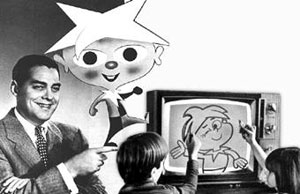
After
all the hype, promises, and experimentation for decades,
it looks as if interactive television is growing to
become a $20 billion dollar venture. However, did
you know that the concept of interactive television
is almost as old as television itself?
The history of videogames, which is a form of interactive
television, is directly related to interaction with
a television or monitor. How did it all start? Many
are familiar with Ralph Baers' work and the notorious
brown box. Perhaps the story you are not familiar
with is that of Winky Dink.
When the Odyssey console was released, it came packaged
with a series of plastic acetate overlays that were
designed to be placed over your television screen.
The overlays simulated color and board graphics, something
technology couldn't then produce, despite the Odyssey
being state of the art at the time.
Is this the first use of plastic overlays and interactive
television? Many believe that it is, but that, my
good friend, is a fallacy!
Enter Winky Dink, a cute loveable pixie character
with a star-shaped hairdo voiced by Mae Questel, also
the voice of Betty Boop. CBS premiered Winky Dink,
and his pals Mysto the Magician, Mike McBean, Dusty
Dan, and Winky's dog Woofer on the hit show "Winky
Dink and You" on Saturday October 10th, 1953 at 10am.
Winky would often get in over his head, and it was
up to the viewer to pull out their handy 50 cent "Official
Winky Dink Kit" and apply a thin sheet of acetate
known as the 'Magic Window' over the television screen.
Also included in the kit were cleanup cloths and crayons.
Kids interacting with the show would be asked to draw
ropes, bridges and other props to help Winky escape
out of trouble, under the direction of the host, Jack
Barry.
The kit sales were phenomenal - well over 2 million
units were sold. It is believed that most mothers
purchased them in a state of panic simply to keep
their children from destroying their television sets,
which were incredibly expensive at the time. It is
certain that many TVs were ruined by youngsters eager
to participate without an official kit by scribbling
on the television sets with crayons or markers, and
no protective acetate!
The original run was over four years. Winky also returned
in 1969 via syndication with 64 all-new episodes and,
of course, a new kit.
Thankfully, we are no longer using plastic acetate
as an input device for interactivity with our televisions.
However, we should never forget Winky, and all that
he did for us!
